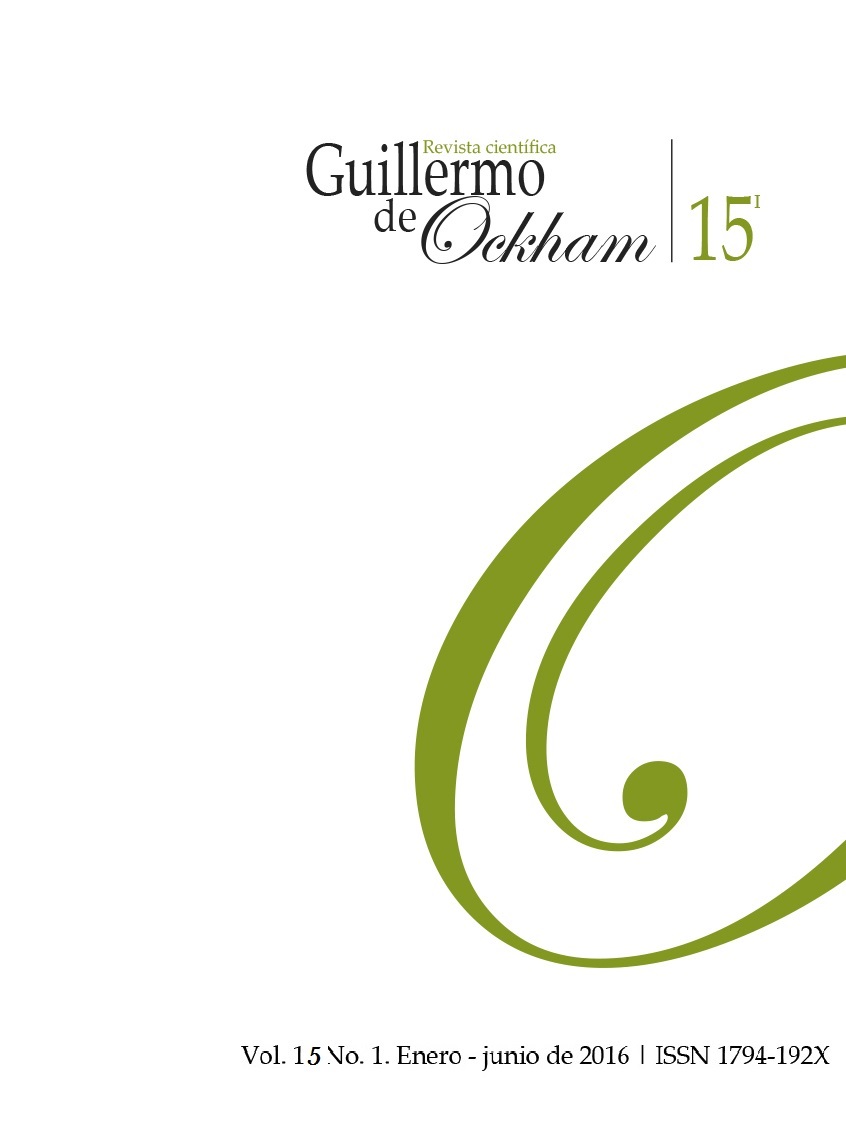La Revista Guillermo de Ockham brinda un acceso inmediato y abierto a su contenido, basado en el principio de ofrecer al público un acceso gratuito a las investigaciones para brindar un intercambio global de conocimiento. A menos que se establezca lo contrario, el contenido de esta revista tiene una licencia con Creative Commons Attribution-NonCommercial-NoDerivatives 4.0 International (CC BY-NC-ND 4.0) http://creativecommons.org/licenses/by-nc-nd/4.0/
- Atribución: debe otorgar el crédito correspondiente, proporcionar un enlace a la licencia e indicar si se realizaron cambios. Puede hacerlo de cualquier manera razonable, pero no de ninguna manera que sugiera que el licenciante lo respalda a usted o su uso.
- No comercial: no puede utilizar el material con fines comerciales.
- Sin derivados: si remezcla, transforma o construye sobre el material, no puede distribuir el material modificado.
- Sin restricciones adicionales: no puede aplicar términos legales o medidas tecnológicas que restrinjan legalmente a otros de hacer cualquier cosa que permita la licencia.
Resumen
Palabras clave:
Referencias
Blanco Ilari, Juan.(2015) Horizontes de Significado y Metamorfósis Óntica: sobre el destino de un diálogo roto. Universidad de San Buenaventura.Cali. Revista Científica Guillermo de Ockham. No.13. pp.25-34.
Bertorello,A. (2008). El Límite del Lenguaje. La Filosofía de Heidegger como teoría de la enunciación.Buenos Aires: Ed.Biblos.
Burnet, John. Platonis Opera.Oxford University Press.1903)
Camilleri,Sylvain.Perrin, Christophe.(2014) Bulletin heideggerien. Centre d'Hermenéutique Phénoménologique. Université Paris-Sorbonne.Paris.2014.
Cockelmans,Joseph (coord). (1980). Studies in phenomenology and Existential Philosophy. On Heidegger and Language. Northwestern University Press.Evanston.1972.
Dreyfus,Hubert.Wrathall.(2005) A Companion to Heidegger. Blackwell Publishing ltd.Malden-USA.
Gadamer, H.G.(1990) Gesammelte 1.Hermeneutik I.Warheit und Methode.Gründzuge einer philosophischen Hermeneutik.Tübingen.J.C.B Mohr.6
Gadamer,H.G.Verità e Metodo. (2001).Bonpiani Il Pensiero Occidentale.Milano.testo tedesco a fronte.
Grondin, Jean (2006). Introducción a la Metafísica. Barcelona: Ed.Herder.
Heidegger,M. Gesamtausgabe.1 Abteilung. Veröffentlichte Schrifte 1910-1976.Band 4. Erläuterung zu Hölderlins Dichtung.Vittorio Klostermann.Frankfurt am Main. 1981
Heidegger,Martin. (2005). Aclaraciones a la Poesía de Holderlin. Madrid: Alianza Editorial.
Heidegger,M. (1999). Introducción a la Filosofía.Madrid: Ed.Cátedra.
Heidegger, M. (2006). Conceptos Fundamentales. Madrid:Ed. Alianza Editorial. 2da.reimpresión
Heidegger, M. Ser y Tiempo (1993). Santiago de Chile:Ed. Universitaria.
Heidegger, M. Sein und Zeit (1984). Ed.Max Niemeyer. Verlag. Tubingen.
Lyons, J (1973). Introducción en la Lingüística Teórica. Barcelona: Ed.Teide.
Navia, W. (2010). Hombre, Ser, Lenguaje. En Navia,M. y Rodríguez, A (compiladores). Hermenéutica. Interpretaciones desde Nietzsche, Heidegger, Gadamer y
Rev. Guillermo de Ockham 15(1), 2017 Articulo IN PRESS
Ricoeur.pp 125-151.Mérida-Venezuela. Universidad de los Andes. Consejo de Publicaciones.
Ordóñez, Edward J. Rasgos de la Ontología Fundamental. Revista Guillermo de Ockham. Vol.12.No.1. Enero-junio 2014. Cali-Colombia.pp.95-102.
Ortega y Gasset, J. (1970). El Hombre y la Gente.Madrid: Ed..Arquero. 6ta edición.
Visbal, M. Filosofía, Lenguaje y Hermenéutica (2010). En Navia, Mauricio y Rodríguez, Agustín (compiladores). Hermenéutica. Interpretaciones desde Nietzsche, Heidegger, Gadamer y Ricoeur.pp 209-221.Mérida-Venezuela.Universidad de los Andes. Consejo de Publicaciones.
































